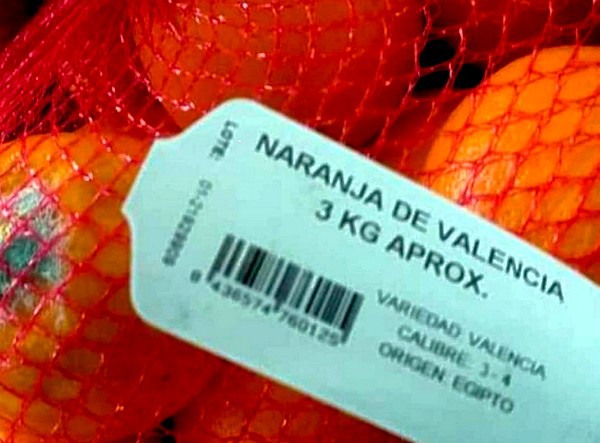La UNIÓ Llauradora has asked the European Commission to initiate an investigation “for possible commercial dumping of citrus fruits from Egypt on the Community market” based on Regulation (EU) 2016/1036 of the European Parliament and of the Council of June 8, 2016, on protection against dumped imports from countries that are not members of the European Union.

During the months of January to April, there is a significant presence of Egyptian citrus in the large European distribution chains. That competition affects our campaign, which was experiencing positive behavior up until a few weeks ago. Now, it's being affected by orange imports from Egypt.”
“The massive shipments of Egyptian oranges to EU markets clearly cause an overlap with the varieties of the European Union's producing countries. In this sense, the EU is a single market and the fact that Egyptian imports are more predominant in some Member States than in others does not imply that these products do not compete in the same market against each other and against the EU's domestic production.”
“Egyptian citrus prices are lower than European citrus prices. The price of a Navel in an Egyptian supermarket stands at around 0.26 euro per kilo and the Valencia variety at 0.15 euro per kilo. The Egyptian Valencia or Navel orange varieties are put in European ports at prices of around 0.55 euro per kilo, which is a little lower than the price of our oranges at the exit of the warehouses."
“These prices are possible because of different factors. One of them is that the minimum wage paid to citrus workers in Egypt during the past year stood at 168.60 euro per month (12 payments), while in Spain it stood at 1,000 euro (14 payments). Egypt's minimum wage is well below the salary paid by EU citrus-producing countries. In addition, Egypt doesn't comply with the international labor conventions of the International Labor Organization (ILO).
“Citrus imports from Egypt, like those from other third countries, have to comply with much lower environmental and phytosanitary standards than the European citrus, which also makes it easier for them to produce very cheaply.”
“It's a problem that affects us now, and it will become worse in the future. Egypt has a total of 23,910,000 orange trees planted, 13,910,000 of which are already in production. The remaining have still not entered their productive phase. Egypt is expected to produce 3.6 million tons of oranges in the current campaign. When the rest of the plants enter production, their production will skyrocket even more.”
For more information:
LA UNIÓ
Tel.: +34 963 530 036
[email protected]
https://launio.org/
